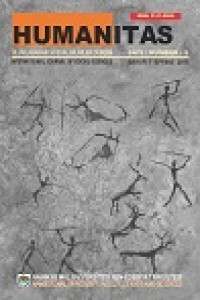Öz
originality of their accounts in their prefaces to provide a reassurance for American middle class readership of their preference of their works over the English whereas Haight’s notice is apologetic and reticent about her motivations for publication. This paper seeks to scrutinize the agency of American authorship in the only travel narrative of the Ottoman Empire by an American woman published in the Antebellum period in the United States. The significance of the geographical denotation is the habitual discursive strategies applied when dealing with the Orient and to determine how Haight dealt with the conflicting notions of being and at the same time depicting the subaltern by “using the sense of sight to gain information is a classic male aristocratic technique, which avoids interaction or any kind of emotional or bodily engagement” which she could not partake in by virtue of being segmented along the gender identification lines at home and in her destination
Anahtar Kelimeler
Travel Narrative Orientalism American Literary Renaissance Subaltern
Kaynakça
- Espmark, K. (1986). Le prix Nobel, histoire d’une consécration littéraire. Paris: Balland.
- Gökalp, E. (2010). Pride and anger: Orhan Pamuk’s Nobel Prize and discourses of nationalism. Anadolu Üniversitesi Sosyal Bilimler Dergisi, 10(3), 171-190.
- Küçüksüleymanoĝlu, Ü. (2014). Nobel Edebiyat Ödülü’nün Yapısı ve Dünya Edebiyatındaki İşlevi. (Yayınlanmamış Yüksek Lisans Tezi). İstanbul: İstanbul Bilgi Üniversitesi Sosyal Bilimler Enstitüsü.
- Nobel, A-B. (27.11.1895), La volonté d’Alfred Nobel. Disponible en ligne: http://www.nobelpreis.org/francais/#volonte.
- Soyak A. (2003). Nobel İktisat Ödülleri Üzerine Bir Yorum. Finans & Politik ve Ekonomik Yorumlar, (256), 74-87.
- Tétu de Labsade, F. (1997). Littérature et dialogue interculturel : culture française d’Amérique. Québec: Presses de l'Université Laval.
- Vural, İ. (2008). Nasıl bir medya: Uzlaşan mı çatışan mı? Orhan Pamuk ve Nobel Ödülü üzerine bir değerlendirme. T.İlter, N. Kara, M. Atabey, Y. Arslan and M. Orun (Eds.). Communication in Peace/ Conflict in Communication
Öz
Nobel ödülleri de sinema ve müzik alanında verilen Oscar ve Grammy ödülleri gibi dünyanın en görkemli ödüllerinden olup her yıl kime ya da kimlere, dil, din, irk ayırt etmeksizin, verileceği dünya kamuoyu tarafından merakla beklenir. Fizik, Kimya, Edebiyat, Tıp ve Ekonomi bilim dallarında ve de Barış alanında İsveç Kraliyet Bilimler Akademisi tarafından verilen bu ödüllerin kime, neden, nasıl değer görüldüğü tartışma konusu olduğu gibi, ödüle değer adaylar da gündemi uzun süre meşgul eder. Dinamitin icatçısı olarak bilinen ve bu anlamda insanlığa karşı büyük bir suç işlediği varsayılan Alfred Nobel (1833- 1896)’in servetinin insanlığa katkısı olanlara ödül olarak dağıtılmasını vasiyet etmesi Nobel ödüllerinin tartışılmasına neden olmuştur. Söz konusu ödüllerle ilgili her daim güncelliğini koruyan bir diğer tartışma ise bu ödüller verilirken gerçekten adayların seçimi nesnel yapılabiliyor mu ya da önceden birilerine söz mü veriliyor? Ve İsveç kraliyetinin dağıttığı bu ödüller ne denli güvenilirdir? Bu çalışmada akıllara takılan bu ve benzeri soruları (Nobel Edebiyat ödülü en çok hangi ülkeye verilmiştir? İsveç akademisi dünya dilleri arasında olmayan “azınlık dillere” ne denli şans tanıyor? Bu saygın ödülün sahibi olmak için yazarların “taraflı” olması şart mıdır? Kadın yazarların erkek yazarlara kıyasla şansları var mıdır?) diğer bütün Nobel ödüllerinde olduğu gibi, tarih boyunca hikâyesi ile tartışmaların odağında yer alan Nobel Edebiyat ödülü çerçevesinde yanıtlamaya çalışacağız.
Anahtar Sözcükler: Nobel Edebiyat Ödülü, Siyaset, İsveç Akademisi, Yazar, Eserler.
WHY HAD NOBEL PRIZE BEEN CRITICIZED?
Abstract: The Nobel Prizes, like the Oscars and Grammys in the film and music industry, are one of the most prestigious awards in the world, and they are eagerly awaited by the general public. The prizes given by the Royal Academy of Sweden, without making a distinction of language, religion and nationality, in the fields of Physics, Chemistry, Literature, Medicine and Economics have long been controversial as to whom, for what reason and how they are awarded; and the laureates occupy the news headlines for a long time. Alfred Nobel (1833-1896), who invented dynamite, and supposedly committed a crime against humanity, had announced in his will that he bequeathed his fortune to those who have contributed to humanity, and that has long caused a perpetual debate on the basis of the prizes. Another issue that is current at the awards is whether the choices are objective. Are these prizes, distributed by the Swedish Academy, really reliable? Are the laureates promised to be awarded earlier? In this work, we try to answer all these questions and more (which country has the most received the Nobel Prize? What is the most advocated language? To receive the Nobel Prize writers should they be engaged? The writers were they as likely as writers?) precisely we study the issue through the Nobel Prize for Literature, which has always been at the heart of discussions on the matter.
Keywords: The Nobel Prize for Literature, Politics, the Royal Academy of Sweden, Authors, Books.
Anahtar Kelimeler
Kaynakça
- Espmark, K. (1986). Le prix Nobel, histoire d’une consécration littéraire. Paris: Balland.
- Gökalp, E. (2010). Pride and anger: Orhan Pamuk’s Nobel Prize and discourses of nationalism. Anadolu Üniversitesi Sosyal Bilimler Dergisi, 10(3), 171-190.
- Küçüksüleymanoĝlu, Ü. (2014). Nobel Edebiyat Ödülü’nün Yapısı ve Dünya Edebiyatındaki İşlevi. (Yayınlanmamış Yüksek Lisans Tezi). İstanbul: İstanbul Bilgi Üniversitesi Sosyal Bilimler Enstitüsü.
- Nobel, A-B. (27.11.1895), La volonté d’Alfred Nobel. Disponible en ligne: http://www.nobelpreis.org/francais/#volonte.
- Soyak A. (2003). Nobel İktisat Ödülleri Üzerine Bir Yorum. Finans & Politik ve Ekonomik Yorumlar, (256), 74-87.
- Tétu de Labsade, F. (1997). Littérature et dialogue interculturel : culture française d’Amérique. Québec: Presses de l'Université Laval.
- Vural, İ. (2008). Nasıl bir medya: Uzlaşan mı çatışan mı? Orhan Pamuk ve Nobel Ödülü üzerine bir değerlendirme. T.İlter, N. Kara, M. Atabey, Y. Arslan and M. Orun (Eds.). Communication in Peace/ Conflict in Communication
Ayrıntılar
| Birincil Dil | Fransızca |
|---|---|
| Bölüm | Tüm Sayı |
| Yazarlar | |
| Yayımlanma Tarihi | 14 Nisan 2015 |
| Yayımlandığı Sayı | Yıl 2015 Cilt: 3 Sayı: 5 |









